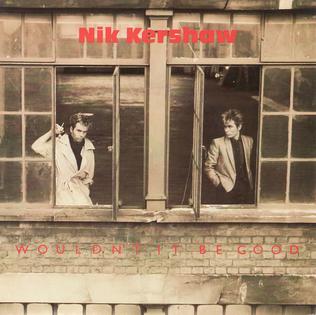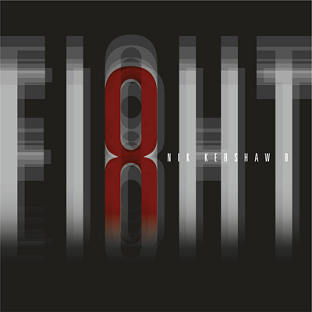Synth-pop is a music genre that first became prominent in the late 1970s and features the synthesizer as the dominant musical instrument. It was prefigured in the 1960s and early 1970s by the use of synthesizers in progressive rock, electronic, art rock, disco, and particularly the Krautrock of bands like Kraftwerk. It arose as a distinct genre in Japan and the United Kingdom in the post-punk era as part of the new wave movement of the late 1970s.

Nicholas David Kershaw is an English singer, songwriter, musician and record producer.

"You've Got a Friend" is a 1971 song written by American singer-songwriter Carole King. It was first recorded by King and included on her second studio album, Tapestry (1971). Another well-known version is by James Taylor from his album Mud Slide Slim and the Blue Horizon. His was released as a single in 1971, reaching number one on the Billboard Hot 100 and number four on the UK Singles Chart. The two versions were recorded simultaneously in 1971 with shared musicians.

The Works is the fourth studio album by the English singer-songwriter and multi-instrumentalist Nik Kershaw. It was released in 1989 and was the last album he created for MCA Records. Kershaw chose the album's title as he felt the album represented "the collected works of Nik Kershaw". He did not release any new solo material until 15 Minutes, 10 years later.

Human Racing is the debut studio album by the English singer-songwriter Nik Kershaw, released on 27 February 1984 by MCA Records. Several songs like "Drum Talk" were based around improvisation; other songs, like "I Won't Let the Sun Go Down on Me", had a political message.

Radio Musicola is the third studio album by the English singer-songwriter Nik Kershaw, released on 24 October 1986 by MCA Records, just under two years after Kershaw's previous studio album, The Riddle (1984). It was the first studio album to be produced by Kershaw. It features guest backing vocalists, including Icehouse's Iva Davies, and Night's Stevie Lange, and Miriam Stockley.

15 Minutes is the fifth studio album by English singer-songwriter Nik Kershaw, released on 6 April 1999.

The Riddle is the second studio album by English singer-songwriter Nik Kershaw, released on 19 November 1984 by MCA Records.

Strictly Inc. is the self-titled project album, released by Genesis keyboardist Tony Banks and Wang Chung lead vocalist Jack Hues, in 1995 on Virgin Records. Banks wanted the album release—as the title suggested—with no reference to the band members, but the record company went against his wishes. This was Banks' fifth studio album, his second issued under a band name, his seventh album overall and his most recent pop album to date.

"Wouldn't It Be Good" is a song by the English singer-songwriter Nik Kershaw, released on 20 January 1984 as the second single from his debut studio album, Human Racing (1984). The release was Kershaw's second single, with the non-album track "Monkey Business" as its B-side; it was a bonus track on the 2012 re-release of the album. The music video was directed by Storm Thorgerson.

"I Won't Let the Sun Go Down on Me" is a song by English singer-songwriter Nik Kershaw from his debut studio album, Human Racing (1984). It was his first single, released on 9 September 1983 to limited success. When re-released on 4 June 1984, the song became Kershaw's highest-charting single on the UK Singles Chart, peaking at number two. It features the non-album track "Dark Glasses" as the B-side, which was also released as a bonus track on the 2012 re-release of the album.

"The One and Only" is the debut single of British singer and actor Chesney Hawkes. Written by Nik Kershaw, the single was released by Chrysalis Records in January 1991. Produced by Kershaw and Alan Shacklock, and recorded and mixed by Gareth Cousins, the song was featured in the 1991 film Buddy's Song which starred Hawkes as the eponymous Buddy and Roger Daltrey as his father. The film performed moderately well at the UK box office, but the song was a hit in that country's music charts, spending five weeks at number one on the UK Singles Chart in March and April 1991. Kershaw's influence can also be heard throughout the track not only in guitar style, but in the backing vocals on the intro and choruses, with Hawkes singing the verses.

Bitterblue is the eighth studio album by Welsh singer Bonnie Tyler. It was released on 11 November 1991, through Hansa Records. Bitterblue is a pop rock album, described by Dieter Bohlen as "more commercial" than her previous albums. Bohlen began working with Tyler in early 1991, writing and producing multiple songs for the album. Bitterblue also features compositions from Albert Hammond, Nik Kershaw and Giorgio Moroder.

"The Riddle" is a song by the English singer-songwriter Nik Kershaw, released in 1984 as the lead single from his second studio album of the same name. Kershaw described the lyrical content as being nondescript to fill as a "guide vocal" for the production. It reached number three on the UK Singles Chart and peaked within the top 10 in countries like Ireland, Norway, Sweden, Australia and New Zealand. An accompanying music video was made for the song and features references to Lewis Carroll's book Alice's Adventures in Wonderland (1865).

"Wide Boy" is a song by English singer-songwriter Nik Kershaw. It was his sixth consecutive top-20 single, peaking at No. 9 on the UK Singles Chart in 1985. It was followed by "Don Quixote" which was to become the last of his string of top-20 singles on the UK chart. "Wide Boy" also charted highly in Ireland and Australia, peaking at No. 5 and No. 7, respectively.

¡Tré! is the eleventh studio album by the American rock band Green Day. It is the third and final installment in the ¡Uno!¡Dos!¡Tré! trilogy, a series of studio albums that were released from September to December 2012. Green Day started recording material for the album on February 14, 2012, and finished on June 26, 2012. ¡Tré! follows the power pop style of ¡Uno!, and the garage rock feel of ¡Dos! The album's title is a nod to the band's drummer Tré Cool, who turned 40 years old two days after the release. Cool is also featured on the album's cover. It is the band's last album as a quartet, as touring guitarist Jason White no longer joins the band in the studio for future albums.

"Elisabeth's Eyes" is a song by English musician Nik Kershaw, released in 1989 as the second and final single from his fourth studio album, The Works (1989). It was written by Kershaw, and produced by Kershaw and Julian Mendelsohn.

Ei8ht is the eighth studio album by Nik Kershaw, released on his independent label Shorthouse Records in 2012. The album reached No. 91 on the UK Albums Chart and No. 12 on the UK Independent Albums Chart.

Oxymoron is the ninth and most recent album by British singer-songwriter Nik Kershaw, released on 16 October 2020. The album was recorded at Abbey Road Studios.
"Sweet Nothing" is a song by the American singer-songwriter Taylor Swift from her tenth studio album, Midnights (2022). Swift wrote the song with Joe Alwyn, who is credited under the pseudonym William Bowery, and produced it with Jack Antonoff. An electric piano-led ballad, "Sweet Nothing" features a bedroom pop production that is reminiscent of 1970s ballads. It is accompanied by saxophone and clarinet accents. The lyrics are about a narrator's appreciation of her lover for his calming presence and simple gestures amidst the chaos of the outer world.


















